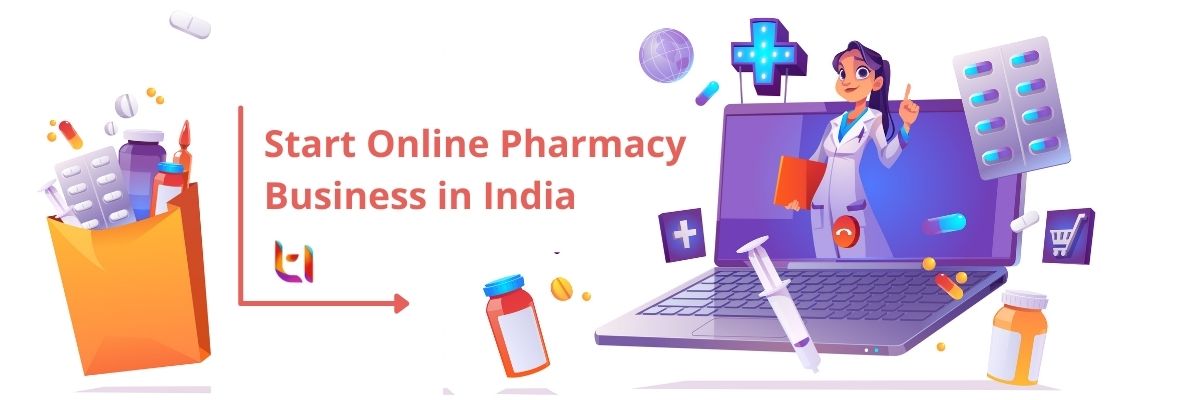An online pharmacy gives prescriptions through the internet and allows patients to communicate with a pharmacist through email or phone instead of visiting a shop. With up to 50% of individuals failing to take their drugs as prescribed, business owners are aiming to reshape the sector by providing a variety of ways to gain information or medical advice.
What Is An E-Pharmacy?
An E-Pharmacy is a pharmacy that sells medicines and pharmaceuticals via the internet and delivers them to consumers. The internet makes everything simple and convenient.
Patients can now purchase medicines online with a prescription from a certified medical practitioner and have them delivered to their home. They’re a huge success, and more and more individuals are preferring to use them instead of going to the local pharmacy store.
How do you start an online pharmacy in India?
In India, there aren’t many online drug stores. There are a variety of reasons why starting an online drug shop, or e-pharmacy, in India is a challenging task. However, the absence of awareness and the law are the two main factors. Only a few people think of online drugstore stores when they think about mindfulness. They do not, however, go into detail on technology.
Because an internet business might be understood in a variety of ways, a large number of them have no idea what it means. Second, several rules and regulations are complicated to follow, stopping people from starting an online pharmacy
Registration for Taxes
You must obtain VAT registration with the state in which your pharmacy is registered. Every drugstore is required to register for VAT and agree to the VAT regulations.
Medication License
The Central Drugs Standard Control Organization and the State Drugs Standard Control Organization both require a license. A “retail drug licence” and a “wholesale drug licence” are the two types of licences provided.
Prerequisite For Obtaining License
A certification or a degree in pharmaceutical studies is required for a retail medicine permit (e.g B.Pharma). For the store, you should have a 10 square metre area. Climate control and refrigerators
Documentation is required
A variety of documents, including your ID, proof of address, application form, and any other important details, will be collected.
Getting An Online Version Started
For ensuring the quality of pharmaceuticals and different prescriptions, you need to have an expert drug specialist on your team.
What are the costs involved in opening an online pharmacy?
In the case of a liability claim, owners will need to purchase a large amount of medical insurance. The average cost of a pharmaceutical claim is more than Rs 14,000, but these figures are only expected to rise as the online healthcare market develops.
Medical professionals must also get licences in both the state from which they sell prescriptions and the state to which they sell prescriptions. (These licences will cost differing levels depending on the state.) Entrepreneurs will also need to employ a lawyer to ensure that they are following all rules to the letter, and they need to pay their healthcare professionals a significant wage to ensure that they are providing high-quality treatment. Finally, businesses must consider discount prices.
What Documents are required for a drug license?
- Proof of ownership, partnership, or directorship with a photo ID.
- The company’s document (Memorandum of Association/Articles of Association).
- Property paper copy (If owned property).
- If the premises are in a residential apartment, plot, or building, an affidavit is required.
- Rent agreement copy (If rented property).
- An affidavit from a licensed pharmacist or other qualified professional.
- The premises’ scope of work and key plan.
- Proof of address (rent agreement/sale deed).
Registration For Pharmacy Business
The Indian Pharmacy Act of 1948 governs the registration of traditional pharmacies. A pharmacist must register all of his information with the state government through a gazette notification, according to the law. After the submission, the registration is decided by a registration court. Hospital, network, and municipal pharmacies are often organised as private companies, whereas independent pharmacies are organised as sole proprietorships or partnerships.
Tax Registration:
In India, the most important tax registration is VAT registration, thus a pharmacist should contact the state’s Sale Tax or VAT Department for more information.
How to Get a Drug License:
A pharmacy must get a drug license from the Central Drugs Standard Control Organization and the State Drugs Standard Control Organization before selling medicines. The Drugs Control Organization primarily issues two types of drug licences:
Licence to Sell Drugs in Retail (RDL):
To operate a general chemist store, you’ll need this licence. You must pay the required fee and have a degree or diploma in pharmacy from an authorized institute or university to obtain this licence.
Licensing for Wholesale Drugs (WDL):
This licence is given to persons or organizations that want to start a pharmaceutical and medication wholesale company. Unlike RDL, there are no strict requirements for obtaining this licence.
Requirements for E-Pharmacy Business:
- A valid prescription is required.
- Drug authorities should be able to check the quality and standards of an online pharmacy business if it has a physical address.
- The Central Licensing Authority requires that e-pharmacies be registered.
- The State Drug Control Authority will award a retail drug licence.
- The presence of a pharmacist is required for accepting prescriptions and addressing customer queries.
- The pharmacy is unable to supply habit-forming medications or chemicals classified as Schedule X.
- Prescription drugs (Schedule H and H1) are only available for purchase with a valid doctor’s prescription.
- E-commerce criteria outlined in the IT Act of 2000 must be followed by online pharmacies.
Common Types of License for Pharmaceutical Business in India
The type of licence your pharmaceutical company needs might be decided by the products or services it offers. The following is a list of the most frequent drug trading and manufacturing licences in India. Please don’t hesitate to contact us to discuss your company so that our licencing specialist can provide you with the best advice possible.
Retail Sale Drug Licence:
An applicant for a Retail Sale Drug Licence for the retail sale of drugs prepares an application. The word “retail sale” refers to a sale for final consumption. It isn’t planned for resale by the buyer. As a result, the buyer is not required to have a drug licence. The medicine might be sold to anybody, including a hospital, dispensary, medical, educational, or research facility.
Wholesale Drug Licence:
A wholesale drug licence is required for a wholesaler of the medicine. The term “wholesale” refers to the selling of a product to someone who intends to resell it; hence, the buyer of these pharmaceuticals must obtain either a wholesale or retail drug licence. Third-party manufacturing is an option for wholesalers. Third-party manufacturing refers to medicines produced by a licenced producer to meet the needs of its customer, i.e. a wholesaler. Before producing any drug under the Wholesaler brand name, such a producer will need to get a brand affidavit.
Drug Manufacturing Licence:
This is a drug manufacturing licence. Any method or part of a process for making, changing, recreating, completing, packaging, labelling, breaking up, or otherwise treating or adopting any medicine with the aim of its sale or distribution is referred to as “manufacture in drugs.”
Loan Licence:
This is a licence that allows you to produce a pharmaceutical utilising the facilities and premises of another company. A valid drug licence and surplus manufacturing capacity are required of the manufacturer who offers the facilities for drug production.
Import License:
In India, an import licence is necessary to import medicines. Drug import licences are granted by the Central Drug Standard Control Organization (CDSCO).
How can we help you?
At Taxxinn, consultants specialized in licences will save you valuable time and apply for the necessary licences. We supported over 1,00,000 satisfied customers and have the best legal expertise to help you in the country. Starting from company registration to any legal requirements service. Our expert teams are always ready to help you at any stage of the process. Contact us right away to get started.

